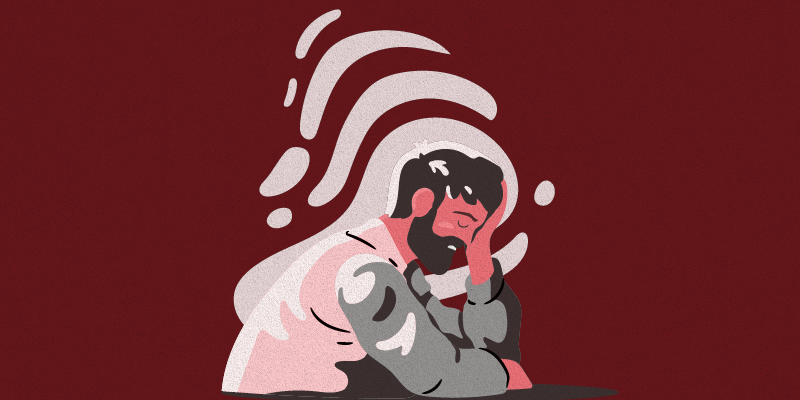
Image credit: Daisy
Brutal.
No other word better describes the emotional whiplash entrepreneurs are experiencing in these unprecedented times. In a survey, among founders during Lockdown 1.0, mental health startup YourDOST found that close to 67 percent of respondents were experiencing medium to high levels of stress due to the coronavirus pandemic.
Close to 34 percent reported feeling nervous, scared, or stressed on the majority of days. By mid-June, close to 46.5 percent of entrepreneurs reported experiencing a rise in their stress levels during the lockdown.
The reasons for this stress and anxiety are no secret.
Founders are reporting heightened distress and worry about how to manage their companies in these circumstances. With work from home being implemented across industries, there’s an immense pressure to keep employees engaged while maintaining productivity.
Additionally, the future of many businesses are at stake due to the impact of the suspension of offline activities such as sales, which usually require in-person meetings and travel. As a result, there is a considerable rise in stress, worry, anxiety, frustration, helplessness, etc., which can become overwhelming even for the most self-assured entrepreneur.
More multitasking than ever before
With COVID-19 impacting businesses and the economy, there is already much to worry about. And to makes matter worse, many entrepreneurs simply do not have an outlet to discuss and vent about what they are experiencing. In fact, they are expected to be even stronger than usual, and even have solutions for all problems.
“There are never-before concerns. There are conversations by managers where teammates are either not listening or just not responding. And there is general angst with managing teams remotely. Sometimes I wonder if I should focus on how can we make money and be operational or manage egos? I know it my job to do both, but in times of war, I am unsure what really works and how it helps,” says the founder of a mid-scale startup, on the condition of anonymity.
Anxiety is common among entrepreneurs. According to Sarah Wilson, author of First, We Make the Beast Beautiful: A New Journey Through Anxiety, says, "It comes down to brain function: their ability to think beyond straight data and to hyper-connect.”
Many entrepreneurs in India are first-time founders, who haven’t even experienced the 2008 recession. But, the COVID-19 crisis has proven to be challenging for seasoned businessmen as well.
As Puroitree Majumdar, Clinical Psychologist Expert at YourDOST, explains, COVID-19 has brought on uncertainty for entrepreneurs and leaders. From startups working in the domestic market to large global players, the ongoing financial crisis has impacted several organisations across industries.
“Many have had to explore how they will survive during these times and had to make tough decisions about downsizing, exploring alternate products, and more. It has definitely led to a mental health crisis for many, increasing doubts and anxiety for some, while others have gone into denial mode. Many are experiencing a lack of control, which further adds to their burden, often leading to burnout or experiencing mental fatigue,” says Puroitree.
Anxiety and insecurity around job stability, taking care of the family in a time of financial uncertainty, and keeping one's skills relevant in the workplace are also concerns of the current times.
Additionally, changes in management and the need to constantly adapt to new policies and ways of doing things where the status quo keeps changing can be overwhelming too.

Image credit: Daisy
Start small
Puroitree says while there are no perfect or right way to take care of mental health, it’s important to focus on taking small steps. She advises one to begin with what is important and make both short and long-term plans.
The next step is to adopt mindfulness-based practices that allow us to focus on the present rather than be stuck in past regrets and future-oriented worries.
“Remember to take time out for yourself and practice self-care, spending time in activities and hobbies that either help us re-energise or relax,” she says.
Focus on valued action
Entrepreneurs need to focus on ‘Valued Action’, which means making decisions and choices that align with values one wants to bring into practice. This allows entrepreneurs to make decisions that are aligned with what is fundamentally important to them.
“As all interaction is now digital, the definition of collaboration among teams has moved to remote collaboration being the primary way of interacting with one another. There has been a sense of loss and vacancy around having so abruptly lost the "physical workspace" for people's work identity, particularly for those who feel a sense of attachment to the office space and the routine that came with it,” says Puroitree.
Set boundaries
With remote working becoming the norm, work and non-work boundaries have become non-existent.
This has led to more restlessness, anxiety, and poor sleep habits because it's tougher to "switch off" from work when working from home. Managing this requires more intentional effort and self-care to keep the work-life balance in place. Take time off to spend time with yourself, your family, and unwinding.
“I find video games quite relaxing, I spend time on ‘Call of Duty’. I try to take calls with my friends and family,” explains an entrepreneur on the condition of anonymity.
Puroitree explains that these days, everyone is looking for flexibility at work. Allow this flexibility by not monitoring your team members often, as long as their work is completed by specific deadlines. Remember that salary is not everything.
Find and seek help
As anxiety levels rise among entrepreneurs, many are being advised to seek help from professional mental health experts. YourDOST also launched a “Founders’ Programme”, which aims to address the mental health needs of startup founders across the country.
The initiative hopes to enable each and every entrepreneur to build grit and adopt a growth mindset while working through challenges that arise in life.
As part of the programme, each founder is assigned a coach (a professional psychologist trained in handling high-performing entrepreneurs), who helps them identify their core issues or areas to work, and breaks the problem down into immediate goal(s).
Over the past year and a half, the startup has administered this programme to over 250 founders, along with accelerators/incubators like Upekkha (SaaS accelerator), NSRCEL (IIM Bangalore’s incubator), and more.
(Edited by Saheli Sen Gupta)
Want to make your startup journey smooth? YS Education brings a comprehensive Funding Course, where you also get a chance to pitch your business plan to top investors. Click here to know more.
Link : https://yourstory.com/2020/08/ys-learn-entrepreneurs-stress-anxiety-coronavirus
Author :- Sindhu Kashyaap ( )
August 19, 2020 at 06:15AM
YourStory



